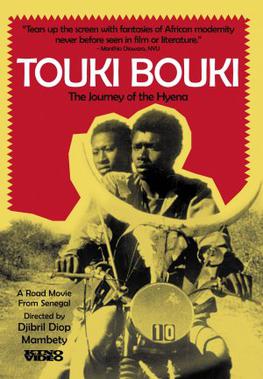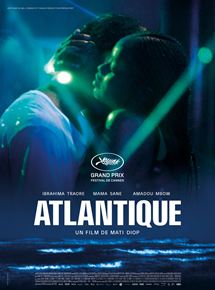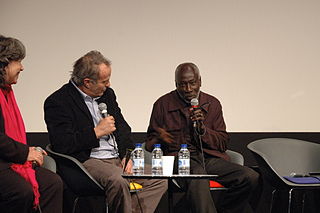
Cinema of Africa covers both the history and present of the making or screening of films on the African continent, and also refers to the persons involved in this form of audiovisual culture. It dates back to the early 20th century, when film reels were the primary cinematic technology in use. As there are more than 50 countries with audiovisual traditions, there is no one single 'African cinema'. Both historically and culturally, there are major regional differences between North African and sub-Saharan cinemas, and between the cinemas of different countries.

Djibril Diop Mambéty was a Senegalese film director, actor, orator, composer and poet. Though he made only five feature films and two short documentary films, they received international acclaim for their original and experimental cinematic technique and non-linear, unconventional narrative style.

The cinema of Senegal is a relatively small film industry which experienced its prime from the 1960s through to the early 1980s, but has since declined to less than five feature films produced in the last ten years. Senegal is the capital of African cinema and the most important place of African film production after its independence from France in 1960.

Senegalese literature is written or literary work which has been produced by writers born in the West African state. Senegalese literary works are mostly written in French, the language of the colonial administration. However, there are many instances of works being written in Arabic and the native languages of Wolof, Pulaar, Mandinka, Diola, Soninke and Serer. Oral traditions, in the form of Griot storytellers, constitute a historical element of the Senegalese canon and have persisted as cultural custodians throughout the nation's history. A form of proto-Senegalese literature arose during the mid 19th century with the works of David Abbé Boilat, who produced written ethnographic literature which supported French Colonial rule. This genre of Senegalese literature continued to expand during the 1920s with the works of Bakary Diallo and Ahmadou Mapaté Diagne. Earlier literary examples exist in the form of Qur’anic texts which led to the growth of a form African linguistic expressionism using the Arabic alphabet, known as Ajami. Poets of this genre include Ahmad Ayan Sih and Dhu al-nun.
Mahama Johnson Traoré (1942–2010) was a Senegalese film director, writer, and co-founder of the Ouagadougou-based Pan-African Cinema Festival (FESPACO).
Mamadou is a common given name in West Africa among predominantly Muslim ethnic groups such as the Mandé and Wolof people. It is a variant of the Arabic name Muhammad.

Badou Boy is a 1970 Senegalese film, directed by Djibril Diop Mambéty. The film follows the adventures of Badou Boy, a cheeky young man, as he travels through the streets of Dakar on the city buses.

Touki Bouki is a 1973 Senegalese drama film directed by Djibril Diop Mambéty. It was screened at the 1973 Cannes Film Festival and the 8th Moscow International Film Festival.
The Nationale 1 Masculin is the highest professional basketball league in Senegal. Established in 1971, the league consists of 16 teams.
Éric Névé, was a French film producer who produced from the early nineteen nineties until his death. In 1993, he founded his own production company, La Chauve Souris. Éric is best known for Jan Kounen’s Dobermann, starring Vincent Cassel and Monica Bellucci, Jean-Paul Salomé’s Female Agents starring Sophie Marceau, and Frédéric Schoendoerffer's Crime Insiders. In 2011, he founded Astou Films, a production company based in Senegal, with whom he produced the French-Senegalese film The Pirogue directed by Senegalese director Moussa Touré, screened in the section Un Certain Regard at the Cannes Film Festival 2012 and in over 80 film festivals across the globe. In 2013 he created, with Nicholas Eschbach an international feature film sales and co-production company, Indie Sales, which focuses on diverse international independent films with a strong commercial potential.

Atlantics is a 2019 internationally co-produced supernatural romantic drama film directed by Mati Diop, in her feature directorial debut. It was selected to compete for the Palme d'Or at the 2019 Cannes Film Festival. Diop made history when the film premiered at Cannes, becoming the first Black woman to direct a film featured in competition at the festival.

Mati Diop is a French film director and actress. She won the Grand Prix at the 2019 Cannes Film Festival for her feature film debut, the supernatural romantic drama Atlantics, and the Golden Bear at the 2024 Berlin International Film Festival for her second feature film, the documentary Dahomey. As an actress, she is known for the drama film 35 Shots of Rum (2008).
Ousmane William Mbaye, is a Senegalese filmmaker. Mbaye is best known as the director of the critically acclaim documentary Mère-Bi and films Doomi Ngacc, Fresque and Kemtiyu, Cheikh Anta. Apart from filmmaking, he is also an executive producer, line producer, screenwriter, foreign producer, director of photography, sound recordist, production manager, editor, and producer.
Mame Bineta Sane, also known as Mama Sané, is a Senegalese actress. She is best known for the role as Ada in the supernatural romantic drama film Atlantics.
Moussa Touré, is a Sénégalese filmmaker. He is best known as the director of critically acclaimed films Toubab Bi, TGV and La Pirogue. Apart from direction, he is also a technician, writer, producer and actor.

Samba Félix N’diaye, was a Sénégalese filmmaker. One of the early pillars in Senegalese cinema industry, Ndiaye is regarded as the father of the African documentary. He made several critically acclaimed Documentary shorts Trésors des poubelles, Ngor, l'esprit des lieux, Les malles and Geti Tey. Apart from direction, he is also a writer and cinematographer.

Banel & Adama is a 2023 French-Malian-Senegalese romantic drama film directed by Senegalese screenwriter Ramata-Toulaye Sy in her feature directorial debut. It premiered at the 76th Cannes Film Festival on 20 May 2023. It was chosen as the Senegalese entry for Best International Feature Film at the 96th Academy Awards.
Karmen Geï is a musical drama film, directed by Joseph Gaï Ramaka and released in 2001. A coproduction of companies from Senegal, France and Canada, the film is an adaptation of Georges Bizet's opera Carmen in a Senegalese setting, with Karmen portrayed as a seductive bisexual criminal who escapes prison to revive her smuggling ring.
Reou-Takh, the name given to Dakar by rural Senegalese, is a film directed by Mahama Johnson Traoré and released in 1972.










